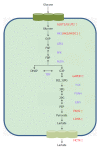Reprogramming of glucose metabolism in hepatocellular carcinoma: Progress and prospects
- PMID: 28018100
- PMCID: PMC5143760
- DOI: 10.3748/wjg.v22.i45.9933
Reprogramming of glucose metabolism in hepatocellular carcinoma: Progress and prospects
Abstract
Hepatocellular carcinoma (HCC) is one of the most lethal cancers, and its rate of incidence is rising annually. Despite the progress in diagnosis and treatment, the overall prognoses of HCC patients remain dismal due to the difficulties in early diagnosis and the high level of tumor invasion, metastasis and recurrence. It is urgent to explore the underlying mechanism of HCC carcinogenesis and progression to find out the specific biomarkers for HCC early diagnosis and the promising target for HCC chemotherapy. Recently, the reprogramming of cancer metabolism has been identified as a hallmark of cancer. The shift from the oxidative phosphorylation metabolic pathway to the glycolysis pathway in HCC meets the demands of rapid cell proliferation and offers a favorable microenvironment for tumor progression. Such metabolic reprogramming could be considered as a critical link between the different HCC genotypes and phenotypes. The regulation of metabolic reprogramming in cancer is complex and may occur via genetic mutations and epigenetic modulations including oncogenes, tumor suppressor genes, signaling pathways, noncoding RNAs, and glycolytic enzymes etc. Understanding the regulatory mechanisms of glycolysis in HCC may enrich our knowledge of hepatocellular carcinogenesis and provide important foundations in the search for novel diagnostic biomarkers and promising therapeutic targets for HCC.
Keywords: Aerobic glycolysis; Glucose metabolism; Hepatocellular carcinoma; Metabolic reprogramming; Noncoding RNAs.
Conflict of interest statement
Conflict-of-interest statement: All authors declare no conflict of interest related to this publication.
Figures

Similar articles
-
Loss of PTEN expression is associated with PI3K pathway-dependent metabolic reprogramming in hepatocellular carcinoma.Cell Commun Signal. 2020 Aug 24;18(1):131. doi: 10.1186/s12964-020-00622-w. Cell Commun Signal. 2020. PMID: 32831114 Free PMC article.
-
Role of Glucose Metabolism Reprogramming in the Pathogenesis of Cholangiocarcinoma.Front Med (Lausanne). 2020 Apr 3;7:113. doi: 10.3389/fmed.2020.00113. eCollection 2020. Front Med (Lausanne). 2020. PMID: 32318579 Free PMC article. Review.
-
Eukaryotic translation initiation factor 5A2 promotes metabolic reprogramming in hepatocellular carcinoma cells.Carcinogenesis. 2017 Jan;38(1):94-104. doi: 10.1093/carcin/bgw119. Epub 2016 Nov 22. Carcinogenesis. 2017. PMID: 27879277
-
The role and mechanism of noncoding RNAs in regulation of metabolic reprogramming in hepatocellular carcinoma.Int J Cancer. 2022 Aug 1;151(3):337-347. doi: 10.1002/ijc.34040. Epub 2022 May 11. Int J Cancer. 2022. PMID: 35460073 Free PMC article. Review.
-
Research progress in the metabolic reprogramming of hepatocellular carcinoma (Review).Mol Med Rep. 2024 Jul;30(1):131. doi: 10.3892/mmr.2024.13255. Epub 2024 May 31. Mol Med Rep. 2024. PMID: 38818815 Free PMC article. Review.
Cited by
-
Identification of Glucose Metabolism-Related Genes in the Progression from Nonalcoholic Fatty Liver Disease to Hepatocellular Carcinoma.Genet Res (Camb). 2022 Nov 3;2022:8566342. doi: 10.1155/2022/8566342. eCollection 2022. Genet Res (Camb). 2022. PMID: 36407083 Free PMC article.
-
mTOR/HDAC1 Crosstalk Mediated Suppression of ADH1A and ALDH2 Links Alcohol Metabolism to Hepatocellular Carcinoma Onset and Progression in silico.Front Oncol. 2019 Oct 4;9:1000. doi: 10.3389/fonc.2019.01000. eCollection 2019. Front Oncol. 2019. PMID: 31637215 Free PMC article.
-
Research progress of abnormal lactate metabolism and lactate modification in immunotherapy of hepatocellular carcinoma.Front Oncol. 2023 Jan 6;12:1063423. doi: 10.3389/fonc.2022.1063423. eCollection 2022. Front Oncol. 2023. PMID: 36686771 Free PMC article. Review.
-
A genomic-clinical nomogram predicting recurrence-free survival for patients diagnosed with hepatocellular carcinoma.PeerJ. 2019 Oct 31;7:e7942. doi: 10.7717/peerj.7942. eCollection 2019. PeerJ. 2019. PMID: 31687273 Free PMC article.
-
TFAIP6 facilitates hepatocellular carcinoma cell glycolysis through upregulating c-myc/PKM2 axis.Heliyon. 2024 May 11;10(10):e30959. doi: 10.1016/j.heliyon.2024.e30959. eCollection 2024 May 30. Heliyon. 2024. PMID: 38813227 Free PMC article.
References
-
- Jemal A, Bray F, Center MM, Ferlay J, Ward E, Forman D. Global cancer statistics. CA Cancer J Clin. 2011;61:69–90. - PubMed
-
- Poon RT, Ng IO, Fan ST, Lai EC, Lo CM, Liu CL, Wong J. Clinicopathologic features of long-term survivors and disease-free survivors after resection of hepatocellular carcinoma: a study of a prospective cohort. J Clin Oncol. 2001;19:3037–3044. - PubMed
-
- Bosch FX, Ribes J, Díaz M, Cléries R. Primary liver cancer: worldwide incidence and trends. Gastroenterology. 2004;127:S5–S16. - PubMed
-
- Upadhyay M, Samal J, Kandpal M, Singh OV, Vivekanandan P. The Warburg effect: insights from the past decade. Pharmacol Ther. 2013;137:318–330. - PubMed
Publication types
MeSH terms
Substances
LinkOut - more resources
Full Text Sources
Other Literature Sources
Medical

